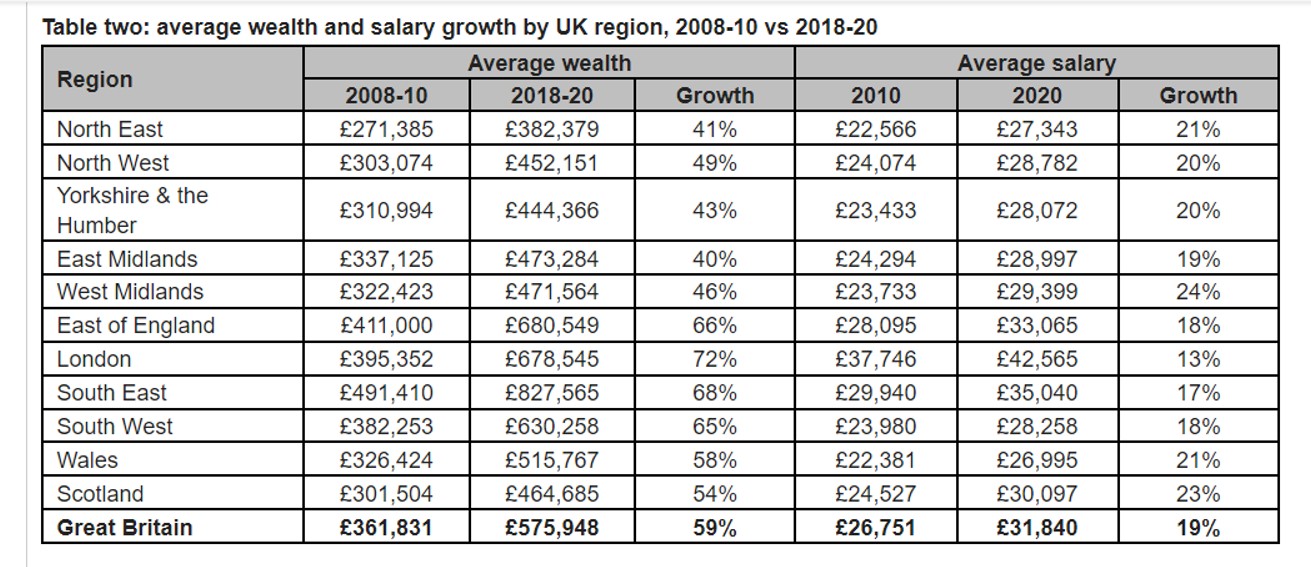Statistics
Wealth Growth Far Outpaced UK Earnings Over Past 10 Years

The claim that wealth – either in financial securities, investments, or in the form of physical property – has risen much faster than earnings is not a new one. New figures in the UK show how large the gap in growth has been. Whether that persists if rates continue to rise is another matter.
If wealth managers want to be reminded why their industry
sometimes attracts unwelcome political attention – not
necessarily with any justice – UK figures from
Handelsbanken Wealth & Asset Management will do the
trick.
The firm has crunched data and found that the growth in average
wealth from assets including property and investments has been
three times higher than the growth in average earnings over the
past decade. It compared the period 2008 to 2010
with 2018 to 2020.
Average wealth has risen 59 per cent over the past 10 years, far
outstripping the 19 per cent salary growth level over the same
period. (Of course, it is important to point out that wealth,
such as in the form of listed securities, physical property and
stakes in companies, is not to be conflated with earnings.)
Drawing on official UK statistics, the bank noted that average
wealth for Britons is estimated at £575,948 ($686,368) after a
decade of growth from £361,831, with house price rises as well as
pensions, investments and physical wealth including possessions
all appreciating in value since 2010. By contrast, average
earnings have only increased to £31,840.
Such figures also highlight why so many more Britons – often to
their alarm – have been dragged into the inheritance tax bracket
(the IHT threshold is £325,000) because of surging property and
equity valuations. (The average UK house price is £278,000 – such
a figure covers a wide variation.) Rising asset values, fueled by
a decade of ultra-low central bank interest rates, have put
housing out of reach of millions of younger adults, setting up
inter-generational political conflicts and frustrations. French
academic Thomas Piketty in 2013 published Capital In the 21st
Century, which claimed that the average return on capital
exceeds the rate of economic growth and that without active
government measures, such as capital taxes, a small number of
asset owners will control an entire economy and prompt political
pushback. Piketty’s argument is debatable because, critics say,
he ignores investment risks, diminishing returns on invested
capital, break-ups of family wealth, and the fact that much of
the recent trend has been caused by governments not capitalism
per se (central bank quantitative easing, etc).
The data
For the wealthiest upper quartile of the population, the growth
in assets has been rapid. This cohort of the population owns
wealth estimated at £733,800 compared with £447,900 a decade ago.
They have seen their wealth increase 34 per cent faster than the
British average, while their salaries have increased 22 per cent
faster.
The figures show that the pattern of wealth holdings is uneven
across the UK. The wealthiest people in London have seen their
wealth grow by 77 per cent over the period to an average
£902,400, compared with £495,200 in 2010. The top 25 per cent
wealthiest in the North East have only seen growth of 30 per cent
during the same period, taking them to an average £459,500, which
equates to an increase of £105,300. Growth among the top quartile
of wealthiest people in the South East was 77 per cent during the
same period, compared with 69 per cent in the East of England and
66 per cent in the South and Wales. The North West saw growth of
45 per cent.
The figures:

Source: Handelsbanken Wealth & Asset Management